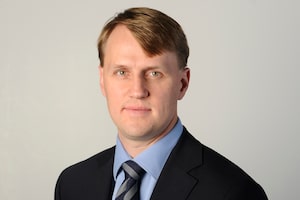Research in Motion CEO Thorsten Heins is pictured during an interview with Thomson Reuters in New York, January 27, 2012.Reuters
It was inevitable, really. Jim Balsillie and Mike Lazaridis had to go—had to give Research In Motion Ltd. to somebody else, someone who could bring fresh tactics to the fight against Apple. And from the moment the company disclosed that its choice was Thorsten Heins, an unknown German-born physicist who had been chief operating officer, it was just as inevitable that a lot of people were going to hate it.
What? Thorsten who? We need a visionary! Rather than find a big name from Silicon Valley, RIM appointed a man about whom the world knew only two things—that his name sounds like a Gilligan's Island character and that he has been at RIM since 2007, the same year Balsillie arrogantly dismissed the iPhone as something he didn't need to worry about. Heins's CV alone was enough to raise doubts: He's been there for almost five years. If he's so smart, why is RIM in this mess?
Investors and other RIM-watchers shouldn't be so quick to judge. Yes, the odds are against him. RIM may already be doomed to be the next Palm—so far behind Apple, Google and Samsung Electronics that it can never catch up. But Heins has a better shot at saving the company than any outsider would.
For those who believe a superstar CEO is the answer, I have two words for you: Mike Zafirovski. In 2005, when the highly touted Motorola executive arrived to save Nortel Networks Corp., he was hailed as "a world-class chief executive with the pedigree and experience to reinvigorate Canada's flagship technology company." One analyst praised him as a guy with the "guts, drive and stamina to clean house." He cleaned house, all right. Four years later, the stock was worth zero and Nortel was being sold off, piece by piece.
Zafirovski's failure is hardly unique. Star executives often flame out after they parachute into companies. Think of Carly Fiorina at Hewlett-Packard, or Carol Bartz at Yahoo. Two years ago, a couple of Texas professors tried to measure the impact of outside CEOs by studying 192 cases. Their conclusion, in a nutshell: Stars get paid a lot to sign up, but their companies often underperform under their watch.
It's hard for pessimists not to worry that RIM is on the same path as Nortel, leaving Canada without a major tech company. But the comparisons are a stretch. Nortel was ruined by a decade of mismanagement: the overexpansion by John Roth, the accounting hijinks of Frank Dunn and the organizational drift of Bill Owens. By the time Zafirovski arrived, the company had nearly $4 billion (all currency in U.S. dollars) in debt, and it had been burning cash every year since 2000.
Heins has inherited a much better situation. RIM is debt-free and still produces oodles of cash (for now). RIM's strategy is basically sound—to turn a North American brand into a truly global one. I'd argue that it has been somewhat successful. In the first nine months of its disastrous current fiscal year, RIM's bright spot was "other" markets—everywhere but the United States, Canada and Britain—where its sales were $8.2 billion, up 48% from the same period a year earlier. How many Canadian companies have that kind of growth in Asia and South America? Any CEO would kill for that.
RIM's biggest problem is that while it was winning in Buenos Aires and São Paulo, its executives lost sight of what was happening in Boston and San Francisco, not to mention Cupertino, California. Balsillie and Lazaridis vastly overestimated the BlackBerry's advantages (the keyboard, security, BlackBerry Messenger), while underestimating the importance of apps and easy web surfing—the strengths of Apple and Android phones.
It was pure hubris from two men who built something so great that they seemed to believe they were practically infallible. That's why they had to take the fall. Their vision was fine. It's the product that sucks.
But that's also why Heins may be the right person for the job. He arrived at RIM when it was the No. 2 player in the world in smartphones, and takes over after it has dropped to fifth place (after Samsung, Apple, Nokia and Taiwan's HTC Corp.). He saw, first-hand, the miscalculations and the high price RIM paid for overconfidence.
Heins has something else going for him: The global market for smartphones is expanding at a furious rate. It grew more than 40% in the third quarter, says Gartner, a tech consulting firm, yet smartphones are only a small percentage of mobile phones being sold today. The fastest growth is in emerging markets, where the BlackBerry has already made inroads.
All Heins needs to figure out is how to catch the tailwind, though it won't be easy. RIM needs phones that don't freeze up. It needs more BlackBerrys with touch screens, web browsers that actually work and Android apps (since developers will never create enough apps for BlackBerry alone). It needs to get a clue about marketing. It needs to accept lower prices than Apple does. It needs to show humility. What it doesn't need is a CEO who has already appeared on the cover of Fortune.
 Derek DeCloet
Derek DeCloet